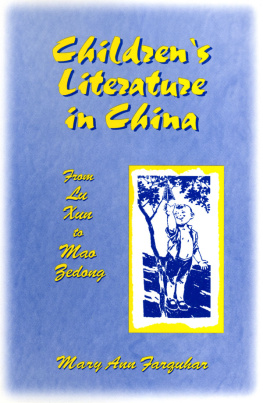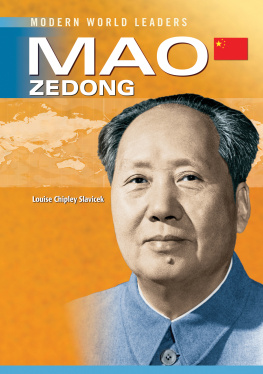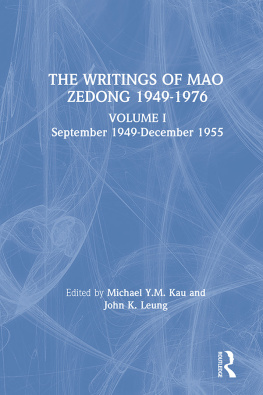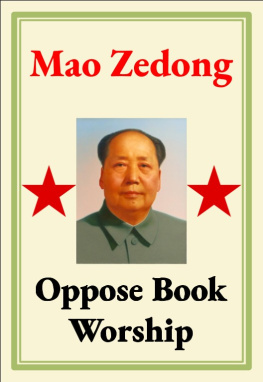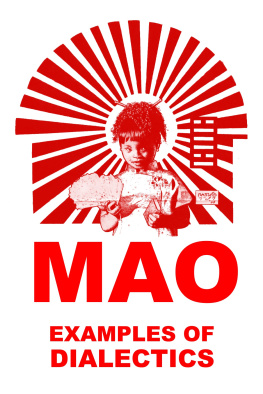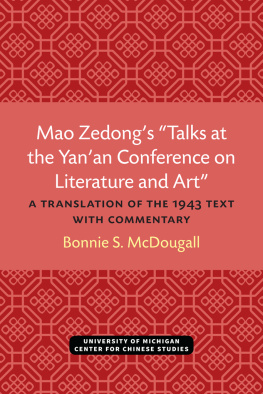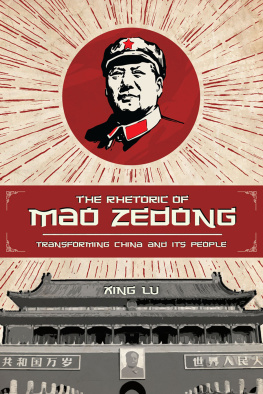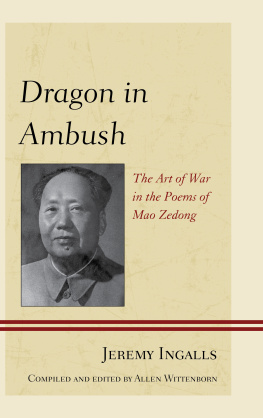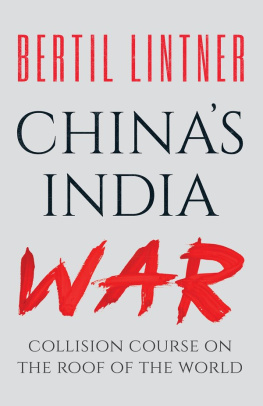CHILDRENS LITERATURE IN CHINA
Studies on Modern China
CHILDRENS LITERATURE IN CHINA
From Lu Xun to Mao Zedong
Mary Ann Farquhor
CHINAS LAST NOMADS
The History and Culture of Chinas Kazaks
Linda Benson and Ingvar Svanberg
HAKKA CHINESE CONFRONT PROTESTANT CHRISTIANITY, 19501900
Jessie G. Lutz and Rolland Ray Lutz
IMAGINING THE PEOPLE
Chinese Intellectuals and the Concept of Citizenship, 18907920
Edited by Joshua A. Fogel and Peter Zarrow
INDUSTRIAL REFORMERS IN REPUBLICAN CHINA
Robin Porter
THE KWANGSI WAY IN KUOMINTANG CHINA, 19311939
Eugene William Levich
SECRET SOCIETIES RECONSIDERED
Perspectives on the Social History of Early Modern South China and Southeast Asia
Edited by David Ownby and Mary Somers Heidhues
THE SAGA OF ANTHROPOLOGY IN CHINA
From Malinowski to Moscow to Mao
Gregory Eiiyu Guidin
MODERN CHINESE WRITERS
Self-Portrayals
Edited by Helmut Martin and Jeffrey C. Kinkley
MODERNIZATION AND REVOLUTION IN CHINA
June Grasso, Jay Corrin, and Michael Kort
PERSPECTIVES ON MODERN CHINA
Four Anniversaries
Edited by Kenneth Lieberthal, Joyce Kallgren, Roderick MacFarquhar, and Frederic Wakeman, Jr.
READING THE MODERN CHINESE SHORT STORY
Edited by Theodore Huters
UNITED STATES ATTITUDES TOWARD CHINA
The Impact of American Missionaries
Edited by Patricia Neils
First published 1999 by M.E. Sharpe
Published 2015 by Routledge
2 Park Square, Milton Park, Abingdon, Oxon OX14 4RN
711 Third Avenue, New York, NY, 10017, USA
Routledge is an imprint of the Taylor & Francis Group, an informa business
Copyright 1999 Taylor & Francis. All rights reserved.
No part of this book may be reprinted or reproduced or utilised in any form or by any electronic, mechanical, or other means, now known or hereafter invented, including photocopying and recording, or in any information storage or retrieval system, without permission in writing from the publishers.
Notices
No responsibility is assumed by the publisher for any injury and/or damage to persons or property as a matter of products liability, negligence or otherwise, or from any use of operation of any methods, products, instructions or ideas contained in the material herein.
Practitioners and researchers must always rely on their own experience and knowledge in evaluating and using any information, methods, compounds, or experiments described herein. In using such information or methods they should be mindful of their own safety and the safety of others, including parties for whom they have a professional responsibility.
Product or corporate names may be trademarks or registered trademarks, and are used only for identification and explanation without intent to infringe.
Library of Congress Cataloging-in-Publication Data
Farquhar, Mary Ann.
Childrens literature in China: from Lu Xun to Mao Zedong / by
Mary Ann Farquhar.
p. cm.(Studieso n modemC hina)
An East gate book.
Includes bibliographicarle ferences anidn dex.
ISBN 0-7656-0344-6( alk. paper).
ISBN 0-7656-0345-4( pbk. : alk. paper)
1. Childrens literature, Chinese20th centuryHistorya nd criticism.
2. Lu, HsUn, 18811936Contributionisn childrens literature, Chinese.
I. Title. II. Series.
PL2449.F37 1998
895.1'099282'0904dc2198-39817
CIP
ISBN 13: 9780765603456(pbk)
ISBN 13: 9780765603449(hbk)
For my mother, Peggy, and in memory of my friend, Dianne
Contents
This book has been researched and written over two decades. I express sincere thanks to the many people who have contributed to its production, though it is impossible to name everyone. There are several exceptions. My son Vishal deserves a special thank you from me for growing up with this manuscript in its various forms.
I give particular thanks to the following people:
Colin Mackerras, doctoral supervisor, colleague and friend; Maureen Todhunter, who edited this book; Jennilyn Mann, who painstakingly put the manuscript into desktop publishing format; Sue Jarvis, for preparing the index; Liz Wilson, Macs at Work, for cover design; Sang Ye, for organizing copyright permission for the illustrations; and Patricia Loo and Doug Merwin at M.E. Sharpe.
I also acknowledge my teachers at Beijing University in the midseventies, who gave me a thorough grounding in Lu Xuns writings and in Mao Zedongs Thoughts, the beginning and the end of this work.
I am grateful to the following publishers for permission to publish illustrations in this book: Foreign Languages Press, Beijing; New World Press; Shanghai Renmin Chubanshe (formerly Shaonian Ertong Chubanshe) and Zhongguo Shaonian Ertong Chubanshe.
CHILDRENS LITERATURE IN CHINA
From its beginnings in the early twentieth century, modern Chinese childrens literature was cast as an ideological tool to reshape China. It aroused deep controversies over concepts of childhood, education and language. At the core of the controversy was its role in Chinas push for modernization. Revolutionariesfrom Lu Xun to Mao Zedonginsisted that the future of China would be decided by Chinese children themselves. To this end, they needed their own distinctive literature.
Children and childrens literature, therefore, emerged as serious political concerns in modern Chinese history. In a China racked by national disintegration and spiritual crisis early this century, children became a symbol of hope for the future. In the past, children represented a continuity of family and traditional values. Early reformers reinterpreted this ideology within an evolutionary framework and fashioned a new image of children: they represented national, not family, continuity, and evolutionary change, not unchanging tradition. Lu Xun was the spokesperson for this position. The Marxists adopted this position but substituted revolutionary struggle for evolutionary change, calling children revolutionary successors (gemingde jiebanren). In a society that valued literature as the primary source of moral values, childrens literature was to be a powerful means to educate the future masters of a modern state.
Yet for all its significance in Chinas recent political and cultural history, in China there are only fragmented and frequently polemical studies of childrens literature despite the wealth of available material. In the West the subject itself has been barely acknowledged. It is not that Chinese themselves attribute little significance to childrens literature. A cursory reading of the relevant twentieth century literature reveals the opposite; renowned Chinese thinkers insisted on the crucial importance of children and their books for Chinese society.
The first modern short story in China, A Madmans Diary (1918) by Lu Xun, ends with the now famous cry, save the children.1 The first childrens magazine in Mao Zedongs guerilla base area exhorted children, in Maos own words and handwriting, to rise up and learn to be free, independent citizens of China.2 In the fifties, Mao told Chinese youth that both the world and Chinas future belonged to them3 and then, as if to prove it, he mobilized them as the energetic red vanguard of the Cultural Revolution that swept China in the sixties. Both liberal reformers and Marxist revolutionaries clearly considered childrens literature an important aspect of any long-term modernization strategy. The cry to save the children meant, ultimately, to save China itself.


